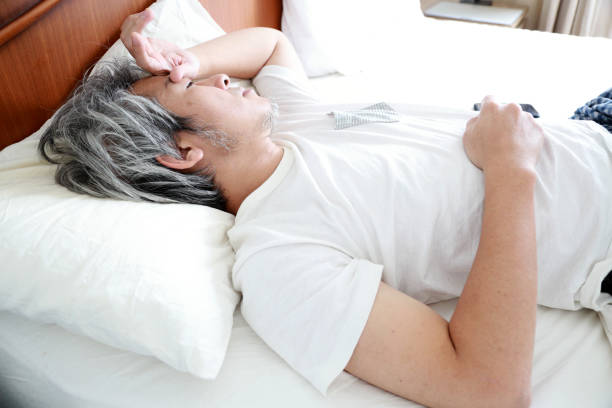Introduction

Parkinson's disease is an incurable, degenerative neurological disorder affecting millions worldwide. But many people need to realize that those with the condition are also likely to experience various sleep problems, from difficulty falling asleep to poor-quality slumber once they drift off.
In this blog post, we'll look into why this connection exists and discuss some strategies for managing these troublesome symptoms so you can get the restorative sleep your body needs. Please keep reading to learn more about Parkinson's disease and its connection to sleep problems!
The connection between Parkinson's disease and sleep problems

Sleep disturbances are common in people with Parkinson's disease (PD). Up to 80% of PD patients report sleep issues. Common issues include insomnia, sleep apnea, restless legs syndrome (RLS), and daytime fatigue.
Difficulty initiating or maintaining sleep is one of the most frequent complaints from people with PD. Insomnia is often due to medical and psychological factors, such as anxiety and depression, which can be associated with PD.
Sleep apnea involves pauses in breathing or shallow breathing during sleep. It is common among people with PD due to the musculoskeletal changes in the upper airway due to the condition.
Restless legs syndrome (RLS) is also more common in people with PD than those without the condition. Symptoms include an urge to move the legs, often accompanied by uncomfortable sensations such as tingling, itching, or burning. This can interfere with sleep quality and quantity.
What is Parkinson's Disease, and how can it cause sleep issues

Parkinson's disease is a condition that gradually affects the nervous system and can lead to tremors, mobility challenges, and other cognitive and physical limitations. Sleep problems are common in those with Parkinson's disease, affecting natural sleep-wake cycles, motor performance, and circadian rhythms.
Proper management of Parkinson's disease and sleep problems requires understanding their connection. Common sleeping issues experienced by those with Parkinson's include difficulty falling asleep, waking up at night, and staying awake during the day. As a result, people with this condition may experience excessive daytime sleepiness or fatigue, further impairing their quality of life.
Common symptoms of Parkinson's Disease that could interfere with sleeping
Here are Common symptoms of Parkinson's Disease
1. Tremor - A tremor is an unintentional, rhythmic movement of a part of the body. It often affects the hands and fingers but can also occur in other body parts, such as the legs or jaw.
2. Muscle Rigidity- Muscle rigidity describes the stiffening of the muscles due to the overactivity of muscle fibers. This can cause a feeling of tightness or resistance to movement that can be uncomfortable and interfere with normal daily activities.
3. Postural Instability- Postural instability is a change in the ability to balance and maintain posture while standing, leading to frequent falls or an increased risk of injury if not managed properly.
4. Bradykinesia - Bradykinesia is a slowness of movement during any voluntary activity, such as walking or writing. This symptom can be especially noticeable when completing tasks quickly or performing complex activities.
How medications used to treat Parkinson's can affect sleep patterns.
Medications for Parkinson's disease have been known to cause sleep disruption and other related issues. These medications are usually prescribed to control the motor associated with the condition, such as tremors or stiffness. While they can relieve these symptoms, they may also contribute to further sleep difficulties and disruptions.
Medications used to treat Parkinson's can cause side effects such as insomnia, excessive sleepiness during the day, vivid dreaming, and disruptions in natural sleep cycles. In particular, medications that increase dopamine levels in the brain can lead to an overstimulated or agitated state which can interfere with a good night's rest.
It is important for those taking medications for Parkinson's to discuss any concerns about sleep disturbances with their physician. In some cases, changes in medication dosage or type may help alleviate these issues, while other treatments, such as cognitive behavioral therapy and melatonin supplements, may also be beneficial for managing sleep problems associated with the condition.
The importance of creating a strong sleep routine for people with Parkinson's Disease
When it comes to managing Parkinson's disease, one of the most important things a person can do is to create and maintain an effective sleep routine. Sleep is essential in regulating several body processes related to PD, including cognitive abilities, motor function, and overall health.
Research has indicated that individuals with Parkinson's disease are at a higher risk of encountering sleep issues such as difficulty falling asleep or staying asleep, excessive tiredness during the day, and disrupted breathing while asleep. It is believed that these issues may be related to the dopamine deficiency that occurs in Parkinson's disease.
Creating a consistent and helpful sleep schedule can enhance the quality of life for individuals with PD. Some strategies that can be used to enhance sleep quality are:
-
Limiting the amount of caffeine, alcohol, and other stimulants during the day.
-
Avoiding strenuous exercise at night.
-
Keeping a consistent bedtime routine (e.g., going to bed at the same time and waking up at the same time each day).
-
Creating a comfortable and dark sleep environment.
-
It is recommended to practice relaxation techniques such as meditation or deep breathing exercises before going to bed.
Available treatments for managing sleep problems related to Parkinson's Disease
Managing sleep problems related to Parkinson's Disease can be difficult, but there are treatments available to help. Some of the most common treatments include medication, lifestyle changes, and physical therapy:
Medication:

Medications such as dopamine agonists, monoamine oxidase inhibitors (MAOIs), and melatonin can help regulate sleep-wake cycles and make it easier to fall asleep and stay asleep.
Lifestyle changes:
Establishing a regular sleep schedule, reducing stress levels, avoiding caffeine late in the day, and exercising regularly can help manage sleep problems related to Parkinson's Disease.
Physical Therapy:
Physical therapy can be helpful for people with Parkinson's Disease who have difficulty moving during sleep. Physical therapists can use various techniques to help improve sleeping habits, including stretching and strengthening exercises.
If you're having trouble sleeping due to Parkinson's Disease, it's crucial to speak with your doctor. By understanding the connection between the two, finding ways to help regulate your sleep-wake cycle and make it easier to get a good night's rest is possible. With the right treatment, you can regain control of your sleep and enjoy more restful nights.
Tips for getting a better night's rest when living with Parkinson's disease
Getting enough sleep is essential for everyone, but it can be especially difficult for those with Parkinson's disease. Many people with Parkinson's strongly connect their sleep problems and the condition's symptoms. Understanding this connection can help you make lifestyle changes to improve your overall quality of life.
I have some suggestions to assist you in achieving a better night's sleep:
1. Create a regular sleep schedule and follow it consistently. This means going to bed and waking up simultaneously every day. Doing so will allow your body to adapt to a consistent sleep pattern.
2. Avoid caffeine late in the day. Caffeine can interfere with sleep, so only drink caffeinated beverages in the morning and early afternoon.
3. Exercise regularly. Regular physical activity is important for good sleep, but avoid exercising too late at night, or you could have trouble falling asleep.
4. Avoid napping during the day. Longer naps can disrupt your sleep schedule, so limit yourself to short naps (less than 30 minutes).
5. Make your bedroom a comfortable place for sleeping. Your bedroom should be dark, cool, and free of noise and distractions. Use comfortable bedding to ensure you get the best rest possible. Movement enhancing sheets and garments are available and these can make bedtime much easier from a mobility perspective.
6. Relax before bedtime. Do something calming before bed, like reading or listening to soothing music. Avoid anything stimulating, such as watching television or checking your email.
7. Talk to your doctor about medications that may help you sleep better. There are medications available specifically for treating insomnia in people with Parkinson's disease, and your doctor can help you determine if one of these drugs is right for you.
By understanding the connection between Parkinson's disease and sleep problems, you can take steps to ensure that you get a better night's rest. These tips will help you establish a regular sleep pattern and ensure your bedroom is conducive to good quality sleep.
If you struggle to manage your sleep problems due to Parkinson's, consider speaking to your doctor. With a careful balance of changes in your lifestyle and the right medication, you can achieve more peaceful nights.
FAQ's
What sleep disorders are associated with Parkinson's disease?
The most common sleep disorders associated with Parkinson's disease are excessive daytime sleepiness (EDS), insomnia, nightmares, and REM sleep behavior disorder. EDS is characterized by difficulty staying awake during the day and can lead to impaired cognition and memory problems. Insomnia is when you have difficulty falling or staying asleep throughout the night.
Nightmares may occur during the REM stage of sleep and can cause anxiety or fear. Lastly, REM sleep behavior disorder is characterized by frequent episodes of acting out dreams while asleep, which can be potentially dangerous.
What lifestyle changes can help improve my sleep?
Changing your lifestyle can greatly help improve your sleep when living with Parkinson's disease. Here are some lifestyle tips that can help you get a better night's rest:
1. Establish a regular sleep routine and stick to it.
2. Avoid caffeine late in the day.
3. Exercise regularly, but early enough at night.
What is the best sleep medication for Parkinson's?
Your doctor has prescribed the best sleep medication for Parkinson's. Your doctor can help you determine which type of medication will most effectively treat your symptoms. Some common medications used to treat insomnia and other sleep-related disorders in people with Parkinson's include nonbenzodiazepines, melatonin agonists, and tricyclic antidepressants.
How do Parkinson's patients sleep?
Parkinson's patients can experience various sleep problems due to their condition. These may include difficulty falling asleep, staying asleep throughout the night, and daytime drowsiness. Certain lifestyle changes, such as establishing a regular sleep routine and avoiding caffeine late in the day, can help improve sleep quality.
What are three treatments for Parkinson's disease?
1. Medications: There are several medications available to treat the symptoms of Parkinson's disease. These can include levodopa, dopamine agonists, MAO-B inhibitors, and anticholinergics.
2. Surgery: Deep brain stimulation (DBS) is a surgical procedure used to reduce tremors and improve motor function in people with Parkinson's.
3. Physical and Occupational Therapy: Physical therapy can help improve movement, balance, and coordination in people with Parkinson's. Occupational therapy can help them develop strategies for performing everyday tasks that may be difficult due to the condition.
Which fruit is good for Parkinson's?
Fruits and vegetables are important for overall health and can help reduce the risk of developing Parkinson's disease. Fruits that may be beneficial include apples, blueberries, strawberries, oranges, and cherries. These fruits contain antioxidants that can help protect against cell damage in people with Parkinson's.
Conclusion
I hope this article has helped you understand the connection between Parkinson's disease and sleep problems. People with the condition often experience sleep disturbances which can adversely affect their quality of life.
It's important to consult with your doctor about potential treatment options if you or someone you know has difficulty sleeping because of Parkinson's. Making lifestyle changes such as establishing a regular sleep routine and avoiding caffeine late in the day can also help improve your sleep quality. Eating fruits and vegetables high in antioxidants can also help reduce cell damage associated with Parkinson's disease.

